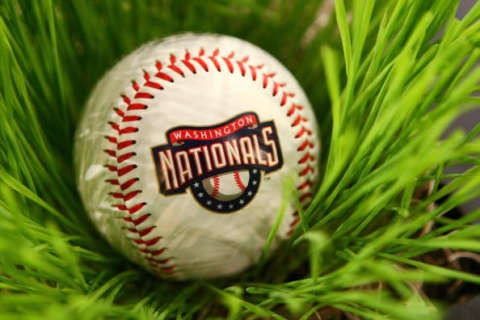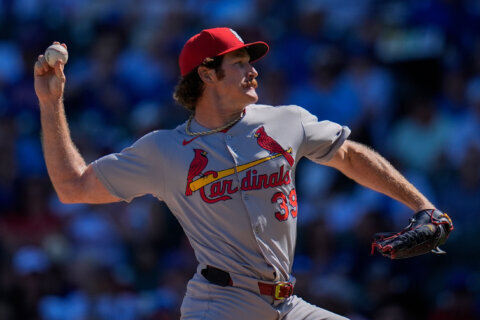The Washington Nationals have rediscovered fun in the clubhouse this year in a way perhaps not seen since 2012, with home run dancing and baby sharks, and all that. But the feel-good moment of the year so far was undoubtedly pitcher Aaron Barrett’s return to the big leagues, the message delivered via an emotional video from his manager all year at Double-A, Matt LeCroy, giving him the news.
After multiple injuries and more than four years out of Major League Baseball, Barrett finally got a chance to pitch (after a pair of false starts) on Saturday night, hurling a scoreless fifth inning with a walk and a strikeout, keeping the Nats within a run of the Braves Saturday night. But while Barrett has finally gotten his chance to prove once again that he belongs in the Nats bullpen, his teammate down the stretch in Harrisburg, Greg Holland, for some reason still hasn’t.
In case you forgot, Holland was picked off the scrap heap last year after a disastrous start, only to turn his season around to the tune of a 0.84 ERA in 24 appearances for the Nats…who let him walk in free agency. He signed instead with the Diamondbacks, but was released following a mediocre half-season in Arizona. The Nationals re-signed him to a minor league deal, and he accepted an assignment to Double-A with no guarantee that he would make it back to the big leagues.
Holland spoke with WTOP during the Eastern League Playoffs last week, before Harrisburg was eliminated Saturday night, and said that he’d been given a couple things to work on.
“I think mainly just having more command of my fastball and cutting down on my walks,” he said. “I’ve felt pretty good about the way I’ve commanded the strike zone down here.”
While Washington’s current crop of relievers continued to struggle, Holland put up about as good of a line as one could expect in his time with the Senators. In eight regular season appearances, he tossed 9.0 innings while allowing one unearned run on four hits, walking three and striking out nine. Counting his two, single-inning Eastern League playoff appearances, his final stats in 11 innings with Harrisburg were a 0.82 ERA, a 0.82 WHIP, 4.33 K/BB and 10.6 K/9 IP.
And yet, on Sunday the Nats decided to purchase the contract of Tres Barrera, Harrisburg’s catcher, while moving Spencer Kieboom to the 60-day disabled list.
It was a curious move for a number of reasons. While Washington’s bullpen has been better lately than it was earlier this year, it has still cost the Nats a number of wins, despite being relied upon for fewer innings than any other bullpen in baseball this season. It is easily the worst in the National League by ERA (5.74), better than only the disastrous Orioles’ relief corps (5.82) overall. No other team currently holding a playoff spot in either league ranks in the bottom half of the league in bullpen ERA, with eight of those nine ranking in the top 10. The Braves are the worst at 12th with a 4.31 ERA, still nearly a run-and-a-half better than Washington (all numbers through Saturday’s games).
The Nats finally, mercifully, dispatched Matt Grace, but there aren’t a host of reliable arms behind that bullpen door. Barrett might well provide more than just an inspirational story, as he posted a 2.75 ERA, 1.05 WHIP and .199 batting average against as the closer in Harrisburg, converting his final 20 save opportunities. Rather than resent Barrett for claiming a roster spot that he might have gotten, Holland was effusive with praise for his former teammate.
“I texted him about how it couldn’t happen to a better person, a better individual. He’s earned it, the way he’s pitched and performed,” said Holland, who missed more than a year earlier in his career on the road back from Tommy John surgery. “That guy was part of the reason why I decided I wasn’t going to worry about the big leagues or this or that, or what’s happened badly for me this season.”
But just because Barrett got the call doesn’t mean there isn’t room for Holland.
The Nationals have made it pretty clear they see Javy Guerra as dispensable, having already designated him for assignment once this year. The righty has been hit-or-miss all year — in 43 appearances, he’s pitched at least one scoreless inning 24 times, but has given up multiple runs in 11 other outings. Like Grace before his DFA, Guerra’s been used mostly in mop-up or emergency situations only this month. He hasn’t been called upon in a game situation with the score closer than four runs since July.
You could be forgiven for looking at Fernando Rodney’s 3.28 ERA with the Nats since being acquired and thinking he’s a reasonable candidate to hold down a spot in the back end of the bullpen. But the facade crumbles when you look at how he’s performed when he’s been asked to get crucial outs. In high leverage situations, opponents are slashing .405/.479/.714 against him — basically, what Anthony Rendon has done during his torrid August — with four home runs in 48 plate appearances. The tighter the game situation, the worse Rodney’s been.
In a small sample, Hunter Strickland has some hilarious platoon splits, dominating righties to the tune of just six singles and a walk against 11 strikeouts in 40 plate appearances (.358 OPS against). But lefties have tattooed him for a .333/.424/.889 line including three doubles and four home runs.
The thought that the team couldn’t use another reliable back-end bullpen arm, especially one they’re familiar with and who has succeeded for them in the recent past, seems preposterous.
According to the MLB Collective Bargaining Agreement, in order to be eligible for the postseason, a player had be on his team’s 40-man roster or 60-day injured list by 11:59 p.m. on Aug. 31. There are exceptions to this rule, but they require a petition to the MLB Commissioner’s Office to replace an existing injured player who has served his entire stint. The good news for the Nats? The NL Wild Card Game isn’t until Oct. 1, and of their players already on the 60-day injured list before this week — Koda Glover and Jonny Venters — Venters was the last one put on, on July 31. Potentially, either could be petitioned to be replaced by current non-40-man members for the playoffs.
The Nats could also clear room more immediately on the 40-man by designating any of their current big leaguers for assignment, or by transferring another player to the 60-day injured list, though they no longer have any viable candidates for that action unless Roenis Elias’s hamstring is worse than expected.
Last week, Holland seemed willing to accept whatever decision the powers that be in Washington handed down.
“If it happens, it happens,” he said. “If not, I’m just going to keep going out here and trying to build on what success I’ve had since I’ve been down here.”
The Nats helped Holland find his stuff again last year, and he’s pitched well once more in their system this year, when the bullpen remains an Achilles heel and they still have work to do just to make the NL Wild Card Game. The time is now if the Nats are going to make the final move available to them to bolster their bullpen, not just for the remaining gauntlet in September, but for the postseason as well.






